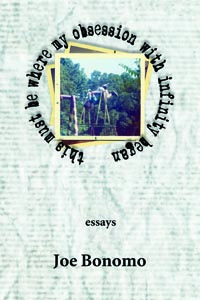“Memoir is made of memories, by definition; some theorists assert memoir must be about memory. Yet it’s notable how much Joe Bonomo explores memory and takes it as his subject. His new collection of essays, This Must Be Where My Obsession with Infinity Began, summons and examines a wide range of memories, expressed in often lyrical sentences. He’s had an ordinary suburban boyhood and adult life, but he makes this material interesting because—as he tells stories, and muses interestingly on their meaning—we find ourselves catching our own cast-off thoughts and doubts, thinking about our own stories,” writes Richard Gilbert on his blog Draft NO. 4. He interviews Bonomo in a June 23 post “Joe Bonomo on sex, spirit & implication.”
Joe Bonomo ’90MA, earned a master’s in English from Ohio University, and some of the essays in his collection This Must Be Where My Obsession with Infinity Began (Orphan Press, 2013) reference memories of his graduate studies at Ohio University. This Must Be Where My Obsession with Infinity Began was the winner of the 2012 Orphan Press Creative Nonfiction Book Contest and is available at http://orphanpress.com/pre-order-this-must-be-where-my-obsession-today.
Gilbert asks Bonomo, “The self and its experiences are what the essayist has to work with, yet in practice both components face the presumed ‘so what’ test and are tricky to pull off. You quote V.S. Naipaul on this: ‘No one cares for your tragedy until you can sing about it.’ Could you discuss this in terms of your own subjects and your use of persona?”
“This is the great paradox of personal writing. Why should the reader care? Because the writer cares? That’s not enough. What I love about Naipaul’s quote is his necessity on song, the crafting. The image I always use, that I’ve discussed before, is of a silhouette: by the end of an essay or a book of autobiographical nonfiction the writer should morph into a silhouette, a persona-outline into which the reader steps, and into which the reader fits, perhaps surprisingly,” Bonomo begins. Read their entire interview at http://richardgilbert.me/2013/06/23/joe-bonomo-on-sex-spirit-implication/.
Gilbert references this excerpt from Bonomo’s essay “Occasional Prayer,” set partly in Ohio University’s chapel:
My occasional prayer finds me less reaching a higher state than desperately shedding ego. Perhaps this explains my impulse to write autobiographically. Does self-addition wiggle from its straightjacket by turning outward to others in an attempt to make larger humane sense? And I wonder, can I pray for that. Prayer does not change God, writes Kierkegaard, but changes him who prays. . . .
Amy and I are back from our drive later, and I’ll repeat to myself what she’d said in the car when I asked her why her prayers are longer than mine. More people to say hello to. More people to stretch toward on the thin prop of prayer. More to caress in absentia, to tap lovingly on a shoulder knowing that touch is a foreign language, not spoken here. There. And I’ll wonder, who do I have to say hello to? Who do I have to surprise, moist-eyed, my mouth moving oddly, slowly, the other tilting his head tenderly to make out the words. Alone to myself in my room, my words perish on the mirror.
Read Joe Bonomo’s blog No Such Thing As Was. His books include This Must Be Where My Obsession With Infinity Began (essays), AC/DC’s Highway to Hell (33 1/3 Series), Jerry Lee Lewis: Lost and Found, Installations (National Poetry Series), Sweat: The Story of The Fleshtones, America’s Garage Band, andConversations With Greil Marcus (edited). He’s the Music Columnist at The Normal School and teaches in the Department of English at Northern Illinois University.



















Comments